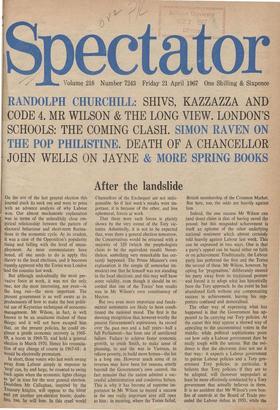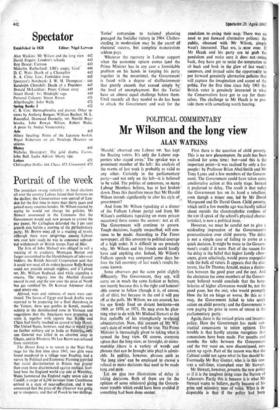After the landslide
On the eve of the last general election this journal stuck its neck out and went to press with an advance analysis of why Labour won. Our almost mechanistic explanation was in terms of the unhealthily close em- pirical relationship between the pattern of electoral behaviour and short-term fluctua- tions in the economic cycle. At its crudest, it was a case of the Opposition's popularity rising and falling with the level of unem- ployment. As most commentators have noted, all one needs to do is apply this theory to the local elections, and it becomes equally apparent why the Tories won London and the counties last week.
But although undoubtedly the most per- vasive force at work, it was not the only one; nor the most interesting, nor even—in the long run—the most important. The present government is as well aware as its predecessors of how to make the best politi- cal use of Keynesian techniques of economic management. Mr Wilson, in fact, is well known to be an assiduous student of these things; and it will not have escaped him that, on the present policies, he could en- gineer a gentle economic recovery in 1968- 69, a boom in 1969-70, and hold a general election in March 1970. Hence his renuncia- tion of any change of course in 1967-68: it would be electorally premature.
In short, those voters who last week swung away from Labour simply in response to `stop' can, by and large, be counted to swing back again when the economic lights change to 'go' in time for the next general election. Doubtless Mr Callaghan. inspired by the Treasury knights, will oppose to the bitter end yet another pre-election boom; doubt- less, too, he will lose. In this cruel world Chancellors of the Exchequer are not indis- pensable. So if last week's results were im- portant, it is because of the other, and less ephemeral, forces at work.
That there were such forces is plainly shown by the very extent of the Tory vic- tories. Admittedly, it is not to be expected that, were there a general election tomorrow, the Conservatives would be returned with a majority of 329 (which the psephologists claim to be the equivalent result). Never- theless, something very remarkable has cer- tainly happened. The Prime Minister's own explanation is the simple (if somewhat im- modest) one that he himself was not standing in the local elections; and this may well have some validity, even though it should be re- corded that one of the Tories' best results was in Mr Wilson's own constituency of Huyton.
But two even more important and funda- mental sentiments are likely to have condi- tioned the national mood. The first is the dawning recognition that, however worthy the present Government's aspirations, its record over the past two and a half years—half a full Parliament—has been one of unrelieved failure. Failure to achieve faster economic growth, to crush Smith, to make sense of planning, to end the war in Vietnam, to relieve poverty, to build more homes—the list is a long one. However much some of its reverses may have been for reasons utterly beyond the Government's own control, the fact remains that the nation admires a suc- cessful administration and condemns failure. This is why it has become of supreme im- portance to Mr Wilson to record a success in the one really important area still open to him: in securing, where the Tories failed, itself an epitome of the other underlying national sentiment which almost certainly told heavily against Labour last week. This can be expressed in two ways. One is that a party's appeal can be based either on faith or on achievement. Traditionally, the Labour Tories' conversion to national planning presaged the Socialist victory in 1964. Clothes- stealing in 'moderation may be the secret of electoral' success, but complete transvestism seldom pays.
Whatever the recovery in Labopr support when the economic upturn comes (and the Prime Minister has in any case a formidable problem on his hands in keeping his party together in the meantime), the Government is faced with a degree of disillusionment that greatly exceeds that caused simply by:. the level of unemployment. But the Tories have an almost equal challenge before them. - Until recently all they needed to do has been to attack the Government and wait for the
pendulum to Awing their way, There was no need to put forward alternative polices : the public, obsessed with 'Mr Wilson, simply wasn't interested. That era, is .dow over. If Mr Heath and his party are to grab the pendulum and make sure it dbes not .1 swing hack, they have got to resist the temptation, to sit back and bask in the glow of last week's successes, and instead seize the opportunity to put forward genuinely alternative policies that will capture the imagination and assent of the public. For the first time since July 1961 the British voter is genuinely interested in what the Conservatives have got. to say for them- selves. The challenge to Mr Heath is to pro- vide them with something worth hearing.







































